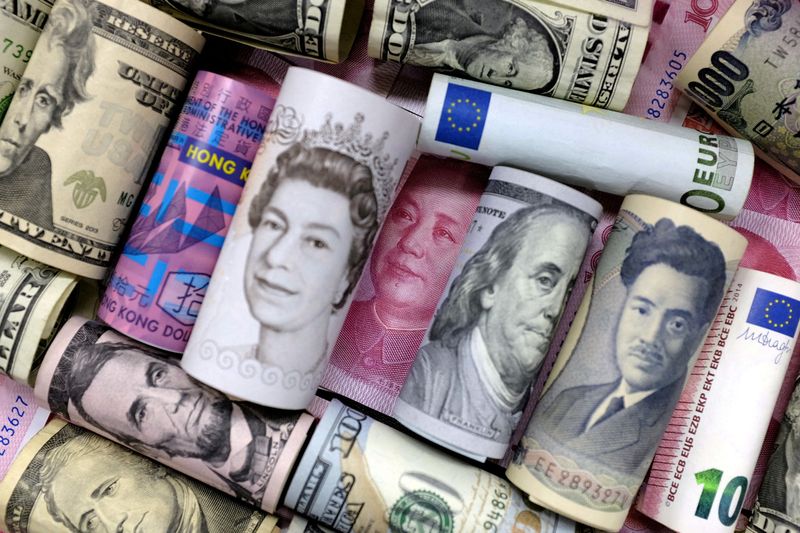[ad_1]
By Alun John and Anna Pruchnicka
LONDON (Reuters) – The greenback was round its highest since November in opposition to a basket of friends on Thursday, after hotter-than-expected U.S. inflation information a day earlier squashed expectations of an rate of interest lower in June, leaving the yen at a 34-year low.
Investor focus will now be on U.S. producer value information and the European Central Financial institution’s coverage assembly later within the day.
The euro was flat at $1.0748, following Wednesday’s 1% fall on the U.S. information. The pound was up 0.18% at $1.2561 after a 1.1% fall a day earlier.
Any change in ECB charges would come as a serious shock to markets, however the focus is on what president Christine Lagarde says concerning the tempo of cuts, after a number of hints from coverage markers in current weeks, some fairly express, that the central financial institution will begin cuts at its June assembly.
The outlook for the ECB and for different central banks has been difficult by the U.S. inflation print which prompted markets to push again considerably their expectations of price cuts from the Federal Reserve, mentioned Simon Harvey, head of FX evaluation at Monex Europe.
“The ECB will possible attempt to be as non-committal as attainable about their path after June at as we speak’s assembly,” he mentioned, including that the financial state of affairs in Europe meant the central financial institution must lower extra sharply than its U.S. counterpart within the coming months, which might ship the euro decrease.
The yen was at 153.26 per greenback, flat on the day, however at its weakest since 1990 once more after a bruising Wednesday which noticed the greenback climb almost 1% on the Japanese foreign money.
That left the little modified on Thursday at 105.16, having hit its highest since November in early commerce.
Markets at the moment are pricing in a 17% likelihood of the Fed chopping charges in June, in contrast with 50% earlier than the CPI information, in line with CME FedWatch device, with September turning out to be the subsequent place to begin for price cuts.
Merchants are additionally pricing in 43 foundation factors of cuts this yr, a lot decrease than the 75 foundation factors of easing projected by the U.S. central financial institution. At the beginning of the yr, merchants had priced in over 150 bps of cuts in 2024.
U.S. producer value inflation information later as we speak might form that image additional, as it can give extra details about what to anticipate from private consumption inflation information, due later within the month, the Fed’s most well-liked gauge of inflation.
The Canadian greenback hit its weakest since November at C$ 1.3702 per U.S. greenback on Wednesday, on the CPI information and after the Financial institution of Canada left charges regular however mentioned a June lower was attainable.
YEN WATCH
The yen’s slide to a 34-year low of 153.24 per U.S. greenback on Wednesday introduced intervention fears again as authorities in Tokyo reiterated they’d not rule out any steps to cope with extreme swings.
Japan intervened within the foreign money market thrice in 2022 because the yen slid towards what was then a 32-year low of 152 to the greenback.
“These warnings from Tokyo will rapidly begin to sound hole and therefore for credibility functions alone, we preserve that intervention appears to be like imminent,” mentioned MUFG analysts in a be aware.
“It might require one additional sharp bounce towards 155.00 (for greenback/yen) to justify it extra clearly given the truth that the strikes up to now actually are extra modest than in 2022 when intervention passed off.”
The yen is down almost 8% in opposition to the greenback this yr, with the foreign money rooted close to 151-per-dollar ranges for the reason that Financial institution of Japan final month ended eight years of detrimental rates of interest.

Low Japanese charges have made the yen the funding foreign money of alternative for carry trades for years, during which merchants sometimes borrow a low-yielding foreign money to then promote and make investments the proceeds in belongings denominated in a higher-yielding one.
Financial institution of Japan Governor Kazuo Ueda mentioned on Wednesday the central financial institution wouldn’t instantly reply to foreign money strikes in setting financial coverage, brushing apart market hypothesis that the yen’s sharp falls might drive it to boost rates of interest.
[ad_2]
Source link





